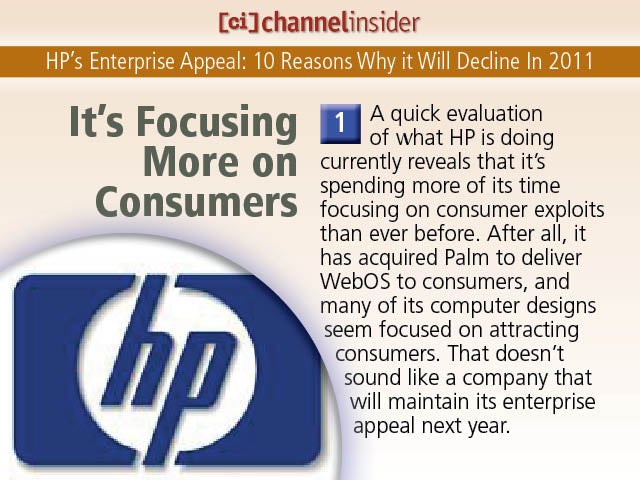 HP’s Enterprise Appeal 10 Reasons Why it Will Decline In 2011
HP’s Enterprise Appeal 10 Reasons Why it Will Decline In 2011
1. It’s Focusing More on Consumers A quick evaluation of what HP is doing currently reveals that it’s spending more of its time focusing on consumer exploits than ever before. After all, it has acquired Palm to deliver WebOS to consumers, and many of its computer designs seem focused on attracting consumers. That doesn’t sound like a company that will maintain its enterprise appeal next year.
 No Title
No Title
2. TabletsCurrently, HP offers the Slate 500, which is designed with enterprise customers in mind. But the company has already indicated that it plans on delivering more tablets next year. And it’s likely that most of those devices will appeal to consumers. It makes sense. At least for now, consumers are driving tablet sales.
 No Title
No Title
3. WebOSWebOS is an extremely important aspect of HP’s entire product mix. And although it’s still in its infancy by most standards, it doesn’t seem to be the kind of operating system that would appeal to enterprise customers. At this point, RIM’s BlackBerry OS is still what corporate users are looking for. And that won’t change when WebOS is updated next year.
 No Title
No Title
4. Follow the MoneyRight now, especially when it comes to mobility, consumers are driving much of the growth. That’s important to keep in mind. And it’s something that HP’s management will undoubtedly remember as it makes decisions next year. Consumers are a key revenue driver and HP simply can’t afford to allow that avenue of growth slip by.
 No Title
No Title
5. Apple ConcernHP is more concerned by Apple than it ever was. And as one might expect, the company is concerned about Apple in the consumer market. Apple still doesn’t get enterprise customers, and it doesn’t have what it takes to win in that space. But it is winning quite handily in the consumer market. And HP wants to stop that from happening.
 No Title
No Title
6. Anti-Microsoft?Microsoft is still performing quite well from a financial perspective, but the company doesn’t seem to have the right strategy in place to appeal to consumers. HP might understand that quite quickly next year and opt to run against Microsoft outside of the PC business and start focusing more on those consumer areas where Microsoft isn’t performing as well with products of its own.
 No Title
No Title
7. RIM’s Mobile MarketHP seems to understand that when it comes to enterprise mobility, RIM still reigns supreme. It also fully understands that for the foreseeable future, that’s not going to change. Realizing that, the question HP must ask is why attempt to beat RIM at a game that it understands better than any other company? The BlackBerry is still tops, and HP doesn’t have the ammunition to take it out right now.
 No Title
No Title
8. Dell Is Focusing on Consumers, TooDell is still HP’s top competitor. And as the company’s Streak tablet and Aero smartphone have shown, it seems firmly committed to appealing to consumers. Considering HP competes heavily with Dell in the computing space, it likely won’t want to allow that company to get the upper hand in other markets. That would only mean that it would focus more of its efforts next year on consumers.
 No Title
No Title
9. Acer ConcernsIf HP is worrying about Dell, the company must be even more worried about Acer. That company is quickly gaining ground on HP in the PC market, and recently it announced that it will be offering tablets next year. As mentioned, the tablet market is still decidedly dominated by consumers. And if HP fears that impact Acer will have, the company will have no choice but to respond with consumer-focused products of its own.
 No Title
No Title
10. The Slow-Moving Corporate WorldHP has been competing in the enterprise space for years. Realizing that, it knows all too well that when it comes to IT staff making decisions, it takes a long time. That’s precisely why HP might not want to wait around for corporate customers to finally decide to adopt a technology or not. At this point, HP needs to capitalize on those customers that will most readily opt for its new products. And that just might be consumers.

